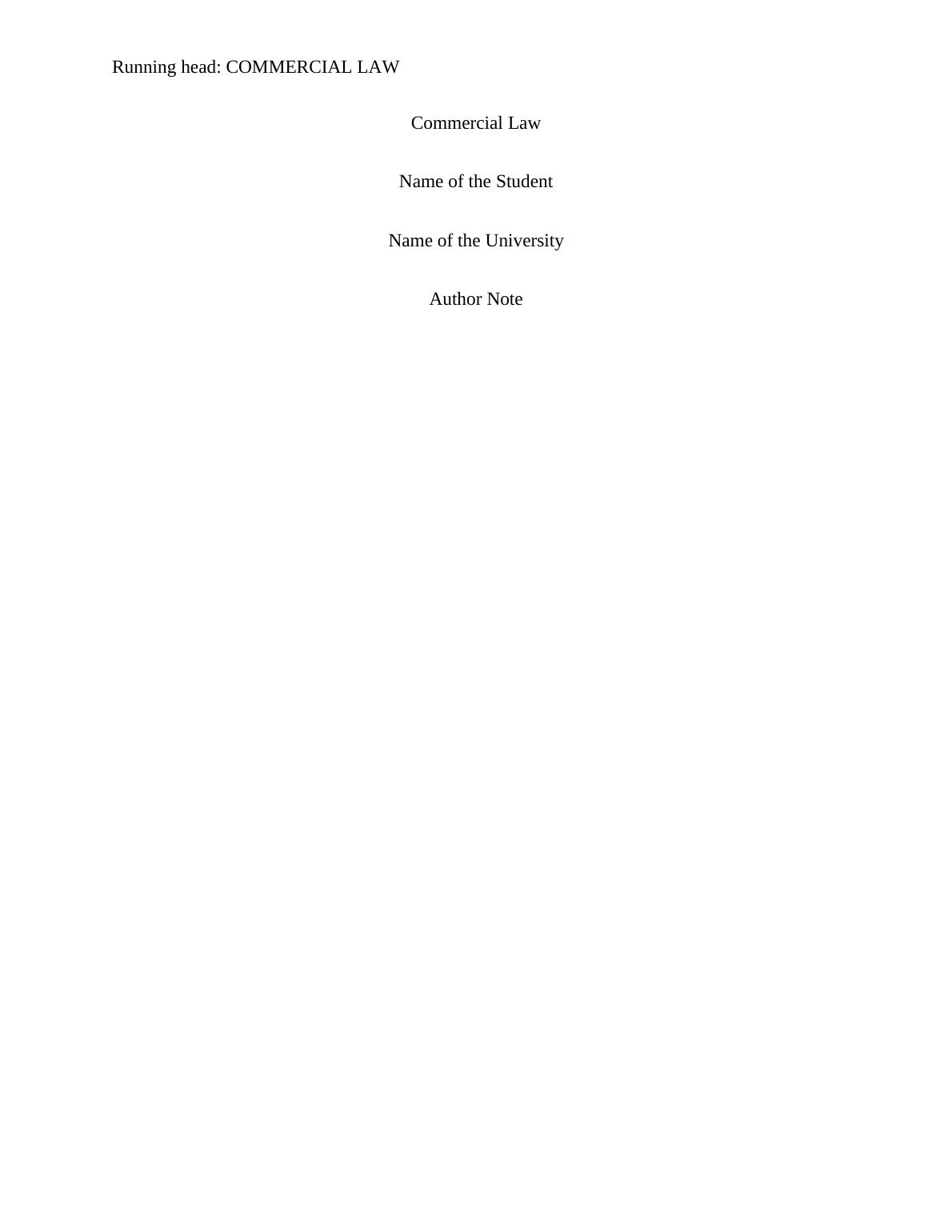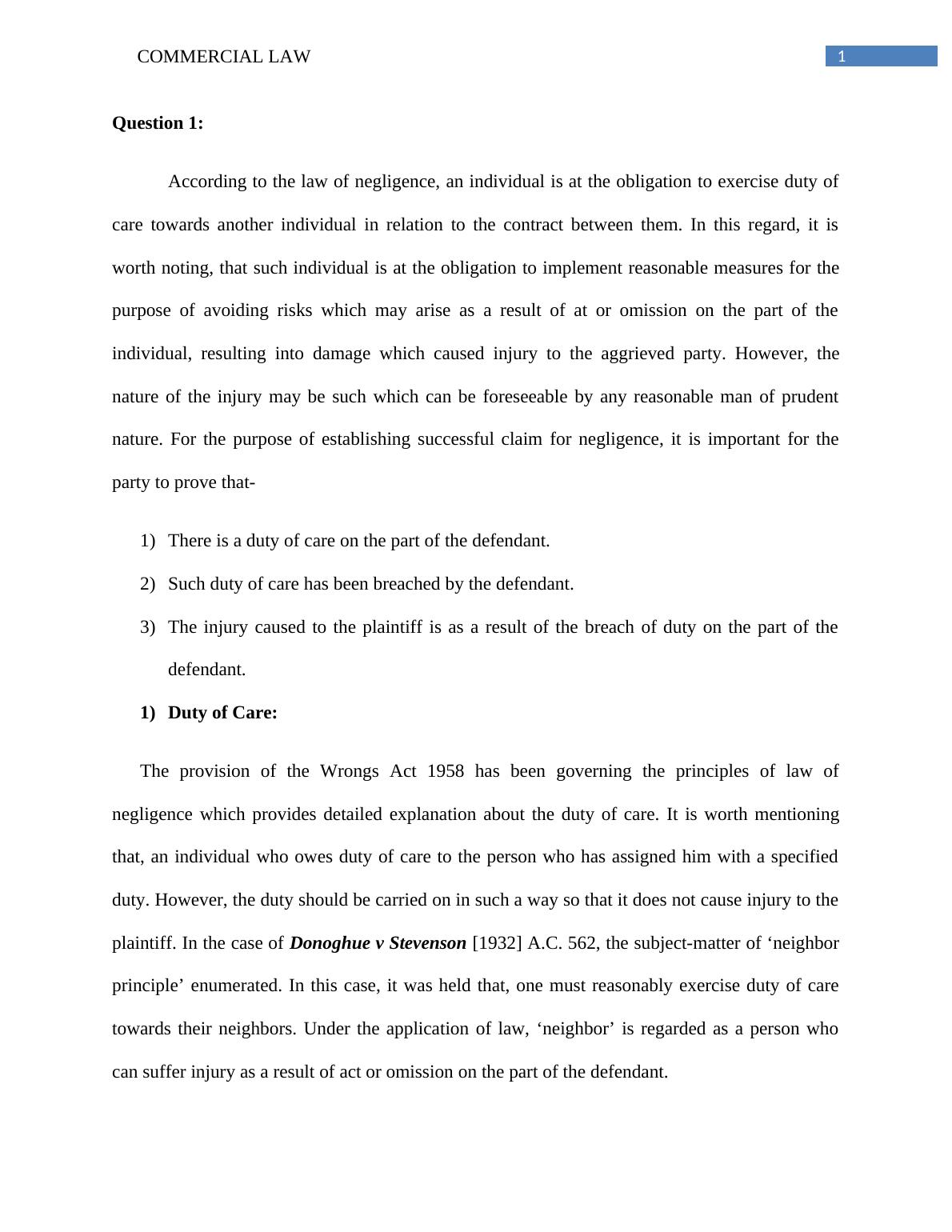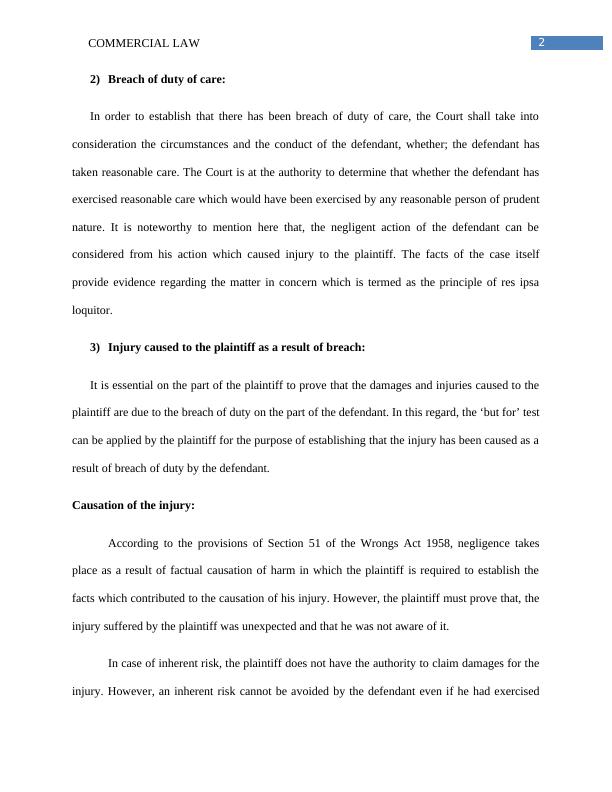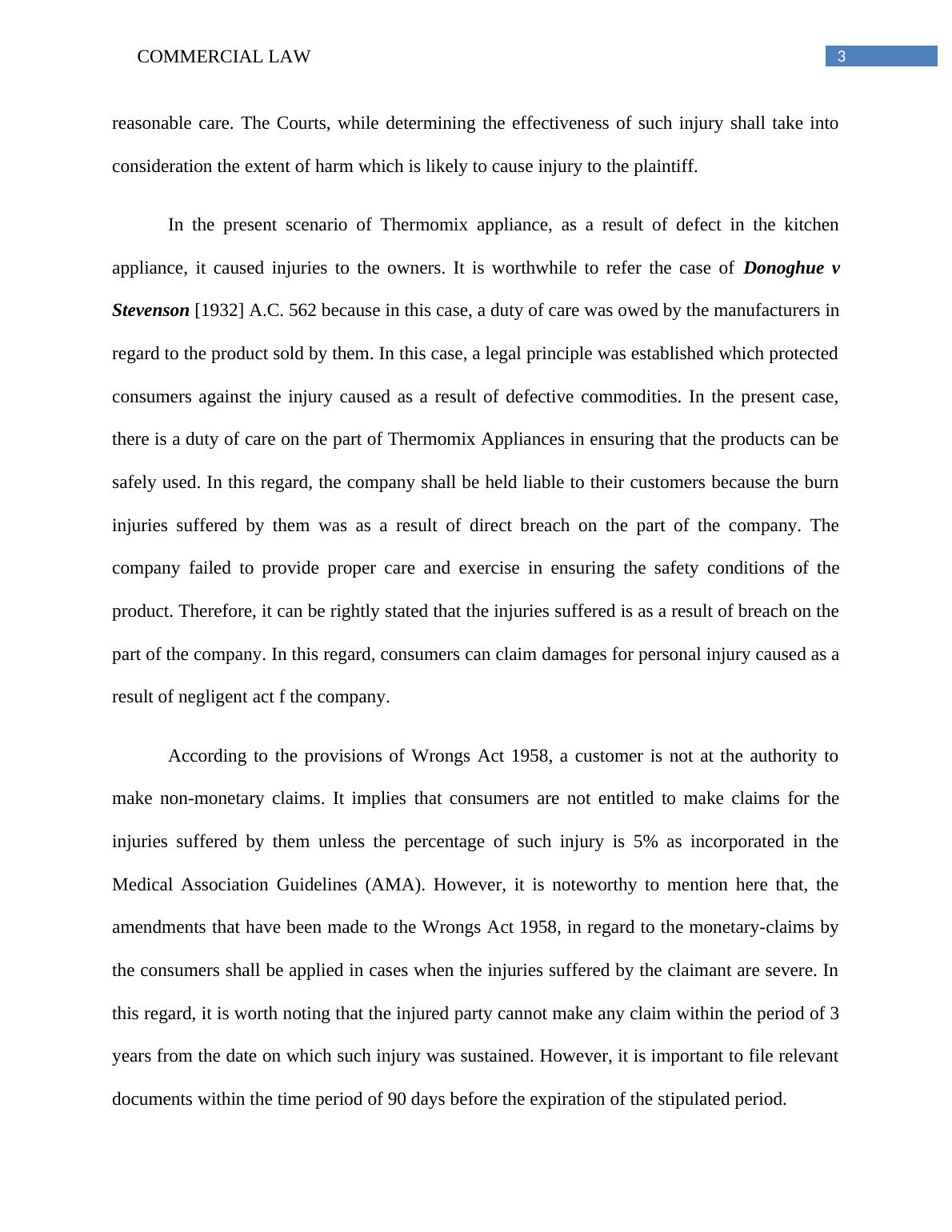Assignment - Commercial Law
11 Pages3159 Words14 Views
Added on 2021-06-18
Assignment - Commercial Law
Added on 2021-06-18
ShareRelated Documents
Running head: COMMERCIAL LAW
Commercial Law
Name of the Student
Name of the University
Author Note
Commercial Law
Name of the Student
Name of the University
Author Note

1COMMERCIAL LAW
Question 1:
According to the law of negligence, an individual is at the obligation to exercise duty of
care towards another individual in relation to the contract between them. In this regard, it is
worth noting, that such individual is at the obligation to implement reasonable measures for the
purpose of avoiding risks which may arise as a result of at or omission on the part of the
individual, resulting into damage which caused injury to the aggrieved party. However, the
nature of the injury may be such which can be foreseeable by any reasonable man of prudent
nature. For the purpose of establishing successful claim for negligence, it is important for the
party to prove that-
1) There is a duty of care on the part of the defendant.
2) Such duty of care has been breached by the defendant.
3) The injury caused to the plaintiff is as a result of the breach of duty on the part of the
defendant.
1) Duty of Care:
The provision of the Wrongs Act 1958 has been governing the principles of law of
negligence which provides detailed explanation about the duty of care. It is worth mentioning
that, an individual who owes duty of care to the person who has assigned him with a specified
duty. However, the duty should be carried on in such a way so that it does not cause injury to the
plaintiff. In the case of Donoghue v Stevenson [1932] A.C. 562, the subject-matter of ‘neighbor
principle’ enumerated. In this case, it was held that, one must reasonably exercise duty of care
towards their neighbors. Under the application of law, ‘neighbor’ is regarded as a person who
can suffer injury as a result of act or omission on the part of the defendant.
Question 1:
According to the law of negligence, an individual is at the obligation to exercise duty of
care towards another individual in relation to the contract between them. In this regard, it is
worth noting, that such individual is at the obligation to implement reasonable measures for the
purpose of avoiding risks which may arise as a result of at or omission on the part of the
individual, resulting into damage which caused injury to the aggrieved party. However, the
nature of the injury may be such which can be foreseeable by any reasonable man of prudent
nature. For the purpose of establishing successful claim for negligence, it is important for the
party to prove that-
1) There is a duty of care on the part of the defendant.
2) Such duty of care has been breached by the defendant.
3) The injury caused to the plaintiff is as a result of the breach of duty on the part of the
defendant.
1) Duty of Care:
The provision of the Wrongs Act 1958 has been governing the principles of law of
negligence which provides detailed explanation about the duty of care. It is worth mentioning
that, an individual who owes duty of care to the person who has assigned him with a specified
duty. However, the duty should be carried on in such a way so that it does not cause injury to the
plaintiff. In the case of Donoghue v Stevenson [1932] A.C. 562, the subject-matter of ‘neighbor
principle’ enumerated. In this case, it was held that, one must reasonably exercise duty of care
towards their neighbors. Under the application of law, ‘neighbor’ is regarded as a person who
can suffer injury as a result of act or omission on the part of the defendant.

2COMMERCIAL LAW
2) Breach of duty of care:
In order to establish that there has been breach of duty of care, the Court shall take into
consideration the circumstances and the conduct of the defendant, whether; the defendant has
taken reasonable care. The Court is at the authority to determine that whether the defendant has
exercised reasonable care which would have been exercised by any reasonable person of prudent
nature. It is noteworthy to mention here that, the negligent action of the defendant can be
considered from his action which caused injury to the plaintiff. The facts of the case itself
provide evidence regarding the matter in concern which is termed as the principle of res ipsa
loquitor.
3) Injury caused to the plaintiff as a result of breach:
It is essential on the part of the plaintiff to prove that the damages and injuries caused to the
plaintiff are due to the breach of duty on the part of the defendant. In this regard, the ‘but for’ test
can be applied by the plaintiff for the purpose of establishing that the injury has been caused as a
result of breach of duty by the defendant.
Causation of the injury:
According to the provisions of Section 51 of the Wrongs Act 1958, negligence takes
place as a result of factual causation of harm in which the plaintiff is required to establish the
facts which contributed to the causation of his injury. However, the plaintiff must prove that, the
injury suffered by the plaintiff was unexpected and that he was not aware of it.
In case of inherent risk, the plaintiff does not have the authority to claim damages for the
injury. However, an inherent risk cannot be avoided by the defendant even if he had exercised
2) Breach of duty of care:
In order to establish that there has been breach of duty of care, the Court shall take into
consideration the circumstances and the conduct of the defendant, whether; the defendant has
taken reasonable care. The Court is at the authority to determine that whether the defendant has
exercised reasonable care which would have been exercised by any reasonable person of prudent
nature. It is noteworthy to mention here that, the negligent action of the defendant can be
considered from his action which caused injury to the plaintiff. The facts of the case itself
provide evidence regarding the matter in concern which is termed as the principle of res ipsa
loquitor.
3) Injury caused to the plaintiff as a result of breach:
It is essential on the part of the plaintiff to prove that the damages and injuries caused to the
plaintiff are due to the breach of duty on the part of the defendant. In this regard, the ‘but for’ test
can be applied by the plaintiff for the purpose of establishing that the injury has been caused as a
result of breach of duty by the defendant.
Causation of the injury:
According to the provisions of Section 51 of the Wrongs Act 1958, negligence takes
place as a result of factual causation of harm in which the plaintiff is required to establish the
facts which contributed to the causation of his injury. However, the plaintiff must prove that, the
injury suffered by the plaintiff was unexpected and that he was not aware of it.
In case of inherent risk, the plaintiff does not have the authority to claim damages for the
injury. However, an inherent risk cannot be avoided by the defendant even if he had exercised

3COMMERCIAL LAW
reasonable care. The Courts, while determining the effectiveness of such injury shall take into
consideration the extent of harm which is likely to cause injury to the plaintiff.
In the present scenario of Thermomix appliance, as a result of defect in the kitchen
appliance, it caused injuries to the owners. It is worthwhile to refer the case of Donoghue v
Stevenson [1932] A.C. 562 because in this case, a duty of care was owed by the manufacturers in
regard to the product sold by them. In this case, a legal principle was established which protected
consumers against the injury caused as a result of defective commodities. In the present case,
there is a duty of care on the part of Thermomix Appliances in ensuring that the products can be
safely used. In this regard, the company shall be held liable to their customers because the burn
injuries suffered by them was as a result of direct breach on the part of the company. The
company failed to provide proper care and exercise in ensuring the safety conditions of the
product. Therefore, it can be rightly stated that the injuries suffered is as a result of breach on the
part of the company. In this regard, consumers can claim damages for personal injury caused as a
result of negligent act f the company.
According to the provisions of Wrongs Act 1958, a customer is not at the authority to
make non-monetary claims. It implies that consumers are not entitled to make claims for the
injuries suffered by them unless the percentage of such injury is 5% as incorporated in the
Medical Association Guidelines (AMA). However, it is noteworthy to mention here that, the
amendments that have been made to the Wrongs Act 1958, in regard to the monetary-claims by
the consumers shall be applied in cases when the injuries suffered by the claimant are severe. In
this regard, it is worth noting that the injured party cannot make any claim within the period of 3
years from the date on which such injury was sustained. However, it is important to file relevant
documents within the time period of 90 days before the expiration of the stipulated period.
reasonable care. The Courts, while determining the effectiveness of such injury shall take into
consideration the extent of harm which is likely to cause injury to the plaintiff.
In the present scenario of Thermomix appliance, as a result of defect in the kitchen
appliance, it caused injuries to the owners. It is worthwhile to refer the case of Donoghue v
Stevenson [1932] A.C. 562 because in this case, a duty of care was owed by the manufacturers in
regard to the product sold by them. In this case, a legal principle was established which protected
consumers against the injury caused as a result of defective commodities. In the present case,
there is a duty of care on the part of Thermomix Appliances in ensuring that the products can be
safely used. In this regard, the company shall be held liable to their customers because the burn
injuries suffered by them was as a result of direct breach on the part of the company. The
company failed to provide proper care and exercise in ensuring the safety conditions of the
product. Therefore, it can be rightly stated that the injuries suffered is as a result of breach on the
part of the company. In this regard, consumers can claim damages for personal injury caused as a
result of negligent act f the company.
According to the provisions of Wrongs Act 1958, a customer is not at the authority to
make non-monetary claims. It implies that consumers are not entitled to make claims for the
injuries suffered by them unless the percentage of such injury is 5% as incorporated in the
Medical Association Guidelines (AMA). However, it is noteworthy to mention here that, the
amendments that have been made to the Wrongs Act 1958, in regard to the monetary-claims by
the consumers shall be applied in cases when the injuries suffered by the claimant are severe. In
this regard, it is worth noting that the injured party cannot make any claim within the period of 3
years from the date on which such injury was sustained. However, it is important to file relevant
documents within the time period of 90 days before the expiration of the stipulated period.

End of preview
Want to access all the pages? Upload your documents or become a member.
Related Documents
Commercial law : Sample Assignment PDFlg...
|14
|3265
|20
Commercial law - Sample Assignment PDFlg...
|12
|3305
|19
(Solution) Commercial Law - Assignmentlg...
|9
|2553
|103
(Doc) Commercial Law : Assignmentlg...
|8
|1387
|36
Australian Corporation Lawlg...
|10
|2629
|105
Commercial Law Issues - Assignmentlg...
|13
|2932
|18
